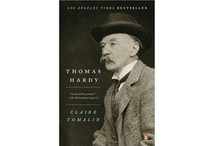Thomas Hardy: The Time-Torn Man
By Claire Tomalin
486 pages;
Penguin
Thomas Hardy is one of the great novelists in the English language, writing in the last third of the 19th century, when the form was at its peak. With George Eliot, Henry James, and Robert Louis Stevenson, he forms a glittering bridge between the Victorian and the modern. Alone among them he made nearly as strong a mark in poetry as in prose. In a new biography, Thomas Hardy: The Time-Torn Man (Penguin), Claire Tomalin meticulously details the life of the author who rattled the English literary world with Tess of the d'Urbervilles, an astonishingly beautiful and sad novelistic ode to a "pure woman," as he put it, felled by rape and pregnancy, and Jude the Obscure, a harrowing tragedy born of a young man's unfulfilled ambitions. Hardy might have been that young man: Of working-class origins in a rigidly hierarchical society, by dint of brains and determination he re-created himself as one of the most popular and respected writers in England—a great man. We think of him now as a rustic, passing damp cold days wandering the fallow fields of Dorset, where so many of his tales take place. But Tomalin—who has been an editor and a prizewinning biographer of Samuel Pepys—reveals his London years, when he dined with lords, ladies, and literary lions, and was an early member of the famously literary Savile Club. Eventually, the fens and marshes drew him home, and he settled near where he was born. The publication of Jude in 1895 made him wealthy, but its moral frankness disturbed the Victorian sensibilities of the English establishment. Thereafter he gave up fiction and wrote only poetry, remaining to the end an intriguing literary consciousness. He produced his greatest poetry in his 70s, drawn from the remembered romance and sharp regret that followed the death of his first wife, Emma. "All comedy, is tragedy," he wrote, "if you only look deep enough into it." Look deep he did, and makes us do as well.
— Vince Passaro


